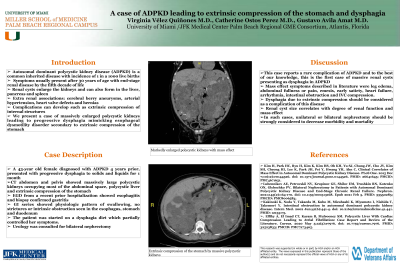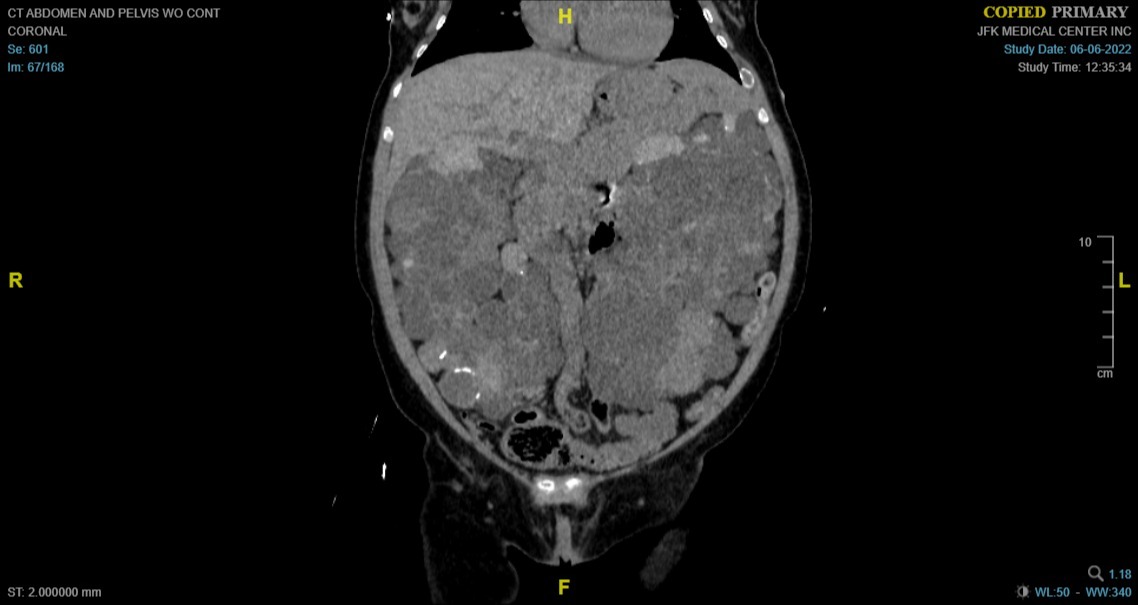Back


Poster Session E - Tuesday Afternoon
Category: Esophagus
E0247 - A Case of ADPKD Leading to Extrinsic Compression of the Stomach and Dysphagia
Tuesday, October 25, 2022
3:00 PM – 5:00 PM ET
Location: Crown Ballroom

Has Audio

Virginia Velez Quinones, MD
University of Miami/HCA JFK hospital
Lantana, FL
Presenting Author(s)
Virginia Velez Quinones, MD1, Catherine Ostos, MD2, Gustavo A. Avila Amat, MD2
1University of Miami/HCA JFK hospital, Lantana, FL; 2University of Miami/HCA JFK hospital, Atlantis, FL
Introduction: Autosomal dominant polycystic kidney disease (ADPKD) is a common inherited disease with incidence of 1 in a 1000 live births. Disease symptoms usually present after 30 years of age and progresses to end-stage renal disease by the fifth decade of life. In addition to development of renal cysts which enlarge the kidneys, these can also form in the liver, pancreas and spleen. In the setting of renal enlargement, serious complications can develop such as extrinsic compression of internal structures. We present a case of massively enlarged polycystic kidneys leading to progressive dysphagia mimicking esophageal dysmotility disorder secondary to extrinsic compression of the stomach.
Case Description/Methods: A 43-year old female diagnosed with ADPKD 4 years prior, presented with progressive dysphagia to solids and liquids for 1 month. Patient suffered from ESRD on hemodialysis. CT abdomen and pelvis showed massively large polycystic kidneys occupying most of the abdominal space, polycystic liver and extrinsic compression of the stomach. EGD from a recent prior hospitalization showed esophagitis and biopsy confirmed gastritis. GI series showed physiologic pattern of swallowing, no strictures or intrinsic obstruction seen in the esophagus, stomach and duodenum. The patient was started on a dysphagia diet which partially controlled her symptoms. Urology was consulted for bilateral nephrectomy.
Discussion: This case reports a rare complication of ADPKD and to the best of our knowledge, this is the first case of massive renal cysts presenting as dysphagia in ADPKD. Mass effect symptoms described in literature were leg edema, abdominal fullness or pain, emesis, early satiety, heart failure, arrhythmia, intestinal obstruction and IVC compression. Dysphagia due to extrinsic compression should be considered as a complication of this disease. Renal cyst size correlates with degree of renal function and mass effect. In such cases, unilateral or bilateral nephrectomy should be strongly considered to decrease morbidity and mortality.

Disclosures:
Virginia Velez Quinones, MD1, Catherine Ostos, MD2, Gustavo A. Avila Amat, MD2. E0247 - A Case of ADPKD Leading to Extrinsic Compression of the Stomach and Dysphagia, ACG 2022 Annual Scientific Meeting Abstracts. Charlotte, NC: American College of Gastroenterology.
1University of Miami/HCA JFK hospital, Lantana, FL; 2University of Miami/HCA JFK hospital, Atlantis, FL
Introduction: Autosomal dominant polycystic kidney disease (ADPKD) is a common inherited disease with incidence of 1 in a 1000 live births. Disease symptoms usually present after 30 years of age and progresses to end-stage renal disease by the fifth decade of life. In addition to development of renal cysts which enlarge the kidneys, these can also form in the liver, pancreas and spleen. In the setting of renal enlargement, serious complications can develop such as extrinsic compression of internal structures. We present a case of massively enlarged polycystic kidneys leading to progressive dysphagia mimicking esophageal dysmotility disorder secondary to extrinsic compression of the stomach.
Case Description/Methods: A 43-year old female diagnosed with ADPKD 4 years prior, presented with progressive dysphagia to solids and liquids for 1 month. Patient suffered from ESRD on hemodialysis. CT abdomen and pelvis showed massively large polycystic kidneys occupying most of the abdominal space, polycystic liver and extrinsic compression of the stomach. EGD from a recent prior hospitalization showed esophagitis and biopsy confirmed gastritis. GI series showed physiologic pattern of swallowing, no strictures or intrinsic obstruction seen in the esophagus, stomach and duodenum. The patient was started on a dysphagia diet which partially controlled her symptoms. Urology was consulted for bilateral nephrectomy.
Discussion: This case reports a rare complication of ADPKD and to the best of our knowledge, this is the first case of massive renal cysts presenting as dysphagia in ADPKD. Mass effect symptoms described in literature were leg edema, abdominal fullness or pain, emesis, early satiety, heart failure, arrhythmia, intestinal obstruction and IVC compression. Dysphagia due to extrinsic compression should be considered as a complication of this disease. Renal cyst size correlates with degree of renal function and mass effect. In such cases, unilateral or bilateral nephrectomy should be strongly considered to decrease morbidity and mortality.

Figure: Massive polycystic kidneys
Disclosures:
Virginia Velez Quinones indicated no relevant financial relationships.
Catherine Ostos indicated no relevant financial relationships.
Gustavo Avila Amat indicated no relevant financial relationships.
Virginia Velez Quinones, MD1, Catherine Ostos, MD2, Gustavo A. Avila Amat, MD2. E0247 - A Case of ADPKD Leading to Extrinsic Compression of the Stomach and Dysphagia, ACG 2022 Annual Scientific Meeting Abstracts. Charlotte, NC: American College of Gastroenterology.
